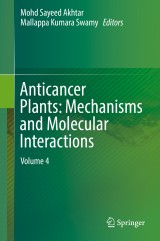Details

Anticancer Plants: Mechanisms and Molecular Interactions
Volume 4|
149,79 € |
|
| Verlag: | Springer |
| Format: | |
| Veröffentl.: | 03.07.2018 |
| ISBN/EAN: | 9789811084171 |
| Sprache: | englisch |
Dieses eBook enthält ein Wasserzeichen.
Beschreibungen
<p>This book summarizes the application of plant derived anticancer compounds as chemopreventives to treat several cancer types, focusing on the molecular mechanisms of action of phytocompounds and providing an overview of the basic processes at the cellular and molecular level that are involved in the progression of the cancer and can be employed in targeted preventive therapies. In addition, it highlights the development of novel anticancer drugs from plant sources using bioinformatics approaches. The compiled chapter data aids readers understanding of issues related to bioavailability, toxic effects and mechanisms of action of phytocompounds, and helps them identify the leads and utilize them against various cancer types effectively. Furthermore, it promotes the use of bioinformatics tools in medicinal plants to expedite their use in plant breeding programs to develop molecular markers to distinguish disease subtypes and predicting mutation, which in turn improves cancer diagnosis and prognosis, and to develop new lead compounds computationally. The book provides scientific verifications of plant compounds mechanisms of action against various cancers and offers useful information for students, teachers, and healthcare professionals involved in drug discovery, and clinical and therapeutic research.<b> </b><br></p>
Chapter 1. Omics- a holistic approach in cancer treatment.- Chapter 2. Plant miRNAs and phytomolecules as anticancer therapeutics.- Chapter 3. Potential of herbal medicines in colorectal carcinoma and their mechanism of action.- Chapter 4. Elucidation of mechanisms of anticancer plant compounds against the tumor cells.- Chapter 5. Computational approach towards exploring interaction of target protein-phytocompounds in drug development for breast cancer.- Chapter 6. Anticancer Potential of Andrographolide, a diterpenoid lactone from Andrographis paniculata: A nature’s treasure for chemoprevention and therapeutics.- Chapter 7. Anticancer activity of herbal medicine: Mechanism of action.- Chapter 8. Metabolomic study of chemo-preventive phytochemicals and their therapeutic prospects.- Chapter 9. CADD studies applied to secondary metabolites in the anticancer drug research.- Chapter 10. Anticancerous plant compounds affecting the power house of cancerous cells: A possible herbal mitocan.-Chapter 11. Phytoestrogens as a natural source for the possible colon cancer treatment.- Chapter 12. Bioinformatics approaches for genomics and post genomics applications of anticancer plants.- Chapter 13. Fruits of Rosaceae family as a source of anticancer compounds and molecular innovations.- Chapter 14. Mechanism of action of anticancer herbal medicines.
<p><b>Dr. Mohd. Sayeed Akhtar</b>, is an assistant professor at Gandhi Faiz-e-Aam College, Shahjahanpur, U.P., India. He received his PhD degree from Aligarh Muslim University (AMU), India in 2008, and conducted his postdoctoral research at the Botanical Institute, University of Basel (BIB), Switzerland (2008-2010) and Chonbuk National University (CBNU), Republic of Korea in 2011, respectively. He worked as an assistant professor at the Department of Biology, College of Natural Sciences, Jimma University, Jimma, Ethiopia form 2011-2014, and as a Fellow researcher at the Institute of Tropical Agriculture, Universiti Putra Malaysia (UPM), Serdang, Selangor, Malaysia (2014-2015). Dr. Akhtar has 14 years of research and 8 years teaching experience in soil microbiology, applied microbiology, environmental microbiology, molecular biology, plant pathology and plant nano-biotechnology. Dr. Akhtar has received several prestigious fellowships at national and international levels. He is one of foremost scientists in the field of plant-microbe interaction and plant nano-biotechnology. He is author and co-author of more than hundred articles in peer-reviewed journals, conference proceedings and book chapters and also edited 5 books. He is an editorial board member and reviewer of several high-impact international journals. His current research is focused on rhizospheric plant-microbe interactions and their molecular biotechnology, bioremediation, biomineralization, nanofertilizers and Nanobiotechnology.<br></p><p><b>Dr. Mallappa Kumara Swamy,</b> is currently a postdoctoral researcher at the Department of Crop Science, Faculty of Agriculture, Universiti Putra Malaysia (UPM), Serdang, Selangor, Malaysia. Dr. Swamy obtained his PhD (Biotechnology) from Acharya Nagarjuna University, Guntur, India in 2013. He has more than 14 years of teaching and research experience in the fields of plant biotechnology, secondary metabolites production, phytochemistry and bioactive studies. He haspublished more than 50 research papers in peer-reviewed journals, and also an editorial board member and reviewer of several high-impact international journals. Dr. Swamy’s research focuses on cell and tissue culture technology for bioactive compound production and their bioactivity, as well as nanotechnology for medical applications.</p>
This book summarizes the application of plant derived anticancer compounds as chemopreventives to treat several cancer types, focusing on the molecular mechanisms of action of phytocompounds and providing an overview of the basic processes at the cellular and molecular level that are involved in the progression of the cancer and can be employed in targeted preventive therapies. In addition, it highlights the development of novel anticancer drugs from plant sources using bioinformatics approaches. The compiled chapter data aids readers understanding of issues related to bioavailability, toxic effects and mechanisms of action of phytocompounds, and helps them identify the leads and utilize them against various cancer types effectively. Furthermore, it promotes the use of bioinformatics tools in medicinal plants to expedite their use in plant breedingprograms to develop molecular markers to distinguish disease subtypes and predicting mutation, which in turn improves cancer diagnosis and prognosis, and to develop new lead compounds computationally. Thebook provides scientific verifications of plant compounds mechanisms of action against various cancers and offers useful information for students, teachers, and healthcare professionals involved in drug discovery, and clinical and therapeutic research.<b> </b><br><p><b></b></p>
Describes the basis of isolated bioactive anticancer compounds from anticancer plants Elaborates on the use of recent molecular techniques for cancer cell detection and treatment Provides an overview to understand the basic causes and consequences involved in the disease diagnosis and their prevention using targeted therapy
Diese Produkte könnten Sie auch interessieren:

Handbook of Poisonous and Injurious Plants

von: Lewis S. Nelson, L.R. Goldfrank, Andrew Weil, Richard D. Shih, Michael J. Balick

117,69 €















